Politics
Trump’s massive megabill passes Senate but what it means for your wallet might shock you
From tax cuts and baby bonuses to cuts in Medicaid and food stamps, the sweeping One Big Beautiful Bill Act touches nearly every American household

Brace yourself, America—President Donald Trump’s “One Big Beautiful Bill Act” just passed the Senate, and whether you’re a student, senior, parent, immigrant, or taxpayer, this sweeping legislation is set to affect you in some way.
With a tie-breaking vote cast by Vice President JD Vance, the Senate version of the bill now heads into final negotiations with the House. Trump hopes to sign it by July 4th, and if he gets his way, the changes could be historic—and controversial.
Here’s a breakdown of what this megabill really means for your life:
Medicaid Recipients: Millions Could Lose Coverage
Under the bill, new work requirements will hit Americans aged 19–64 enrolled via Medicaid expansion. Many will need to prove they’re working, volunteering, or studying at least 80 hours a month. States will also receive less federal funding, likely resulting in reduced benefits, tougher eligibility, and more red tape.
Nearly 12 million people could become uninsured by 2034, according to the Congressional Budget Office (CBO).
Food Stamp Users: Work or Lose Benefits
SNAP recipients, especially older adults and parents, must now work to keep food assistance. States will be forced to pay more administrative costs, possibly leading to benefit cuts or eligibility rollbacks.
Obamacare Enrollees: Tougher Times Ahead
The bill tightens verification requirements, ends automatic re-enrollment, and slashes subsidy access—meaning millions could lose Affordable Care Act coverage.
Taxpayers: Some Relief, Some Disappointment
The good news? The bill extends Trump’s 2017 tax cuts, including lower income tax rates and a larger standard deduction. The average household would save $2,900, according to the Tax Policy Center.
However, wealthier Americans gain far more:
- Top 20% earners get 60% of the total tax benefit
- Lower-income Americans only see about $150 in savings
Seniors: Temporary Tax Boost but Medicaid Cuts Loom
Seniors will receive a $6,000 standard deduction boost from 2025–2028. However, many dual-enrolled in Medicare and Medicaid may lose critical benefits like long-term care or dental coverage.
Parents: Bigger Credits, Stricter Rules
The child tax credit jumps to $2,200 per child, with income thresholds expanded. But parents with older children could lose Medicaid and SNAP access if they don’t meet new work mandates.
Babies: Welcome to the MAGA Account Era
All U.S. babies born from 2025–2028 will get a $1,000 government nest egg, with parents allowed to add up to $5,000 per year. Withdrawals are restricted until age 18. The idea, originally dubbed the “MAGA account,” is now branded as Trump Accounts.
Student Borrowers: Loan Access Shrinks
Federal student loan limits are tightened for grad students and parents. Forgiveness programs and deferment options will be reduced, making higher education more expensive for many.
Workers with Tips or Overtime: Temporary Tax Breaks
- $25,000 of tips can be deducted
- $12,500 in overtime pay can also be tax-free
But only through 2028—and only for those making under $160,000.
EV Buyers and Green Energy Advocates: Major Blow
The EV tax credit of $7,500 ends September 2025, years earlier than expected. Solar and wind tax credits will now expire in 2027, accelerating a retreat from clean energy.
Elon Musk slammed the bill on X, calling it “political suicide” and accusing Republicans of “destroying the future.”
Immigrants: Narrowed Access and Higher Fees
Noncitizens, including refugees and asylum seekers, may lose access to Medicaid, SNAP, and ACA subsidies. Fees for work permits, asylum, and court filings will rise sharply.
Private Colleges: Huge Tax Hike for Elite Schools
Universities like Harvard and Yale will see their endowment income tax jump from 1.4% to 8%, targeting schools with endowments over $2 million per student.
Car Buyers: Good for Gas, Bad for Electric
Buy a new American-made car? You can now deduct up to $10,000 in interest on your loan.
But EV buyers? Say goodbye to your clean energy tax break.
Millionaires: No More Unemployment Checks
Yes, it happened—thousands of millionaires filed for unemployment in 2021–22. This bill puts an end to that loophole.
National Debt Watchers: Prepare to Worry
The CBO estimates the bill will add $3.3 trillion to the deficit over 10 years and raise the debt ceiling by $5 trillion. Interest rates could rise, making loans and credit cards more expensive for everyone.
Trump’s Border Wall: Fully Funded at Last
The bill allocates a whopping $46.5 billion for the border wall and another $45 billion for ICE detention operations—finally delivering on Trump’s long-standing promise.
Politics
Brendan Carr to face Senate grilling after “free speech firestorm” over Jimmy Kimmel controversy — Ted Cruz calls remarks “dangerous as hell”
FCC Commissioner Brendan Carr will testify before the Senate Commerce Committee after his comments suggesting ABC affiliates could lose their licenses over Jimmy Kimmel’s remarks on Charlie Kirk’s killing triggered backlash from both parties.

Federal Communications Commission (FCC) Chairman Brendan Carr is set to testify before the Senate Commerce Committee following an escalating free speech controversy that began with his comments about Jimmy Kimmel last month.
Carr’s upcoming appearance — confirmed by a committee representative and first reported by Semafor — comes after weeks of intense political and media scrutiny surrounding his remarks that appeared to threaten broadcast licenses of ABC affiliates over Kimmel’s coverage of the killing of conservative activist Charlie Kirk.
ALSO READ : Charlie Hunnam reveals chilling transformation into serial killer Ed Gein for Ryan Murphy’s Monster… “I didn’t want to glamorize it”
The hearing, to be chaired by Republican Senator Ted Cruz, will mark the first time Carr has publicly addressed the controversy since it ignited a bipartisan debate about government overreach and free speech protections in broadcasting.
The controversy: Kimmel’s remarks and Carr’s warning
The uproar began on September 17, when Carr appeared on a conservative YouTube talk show and reacted to comments Kimmel made on Jimmy Kimmel Live! following the reported assassination of Charlie Kirk, a prominent right-wing activist and founder of Turning Point USA.
During the interview, Carr implied that local ABC affiliates could face repercussions from the FCC for airing Kimmel’s segment.
“When we see stuff like this, look, we can do this the easy way or the hard way,” Carr said. “These companies can find ways to change conduct, on Kimmel, or there’s going to be additional work for the FCC ahead”
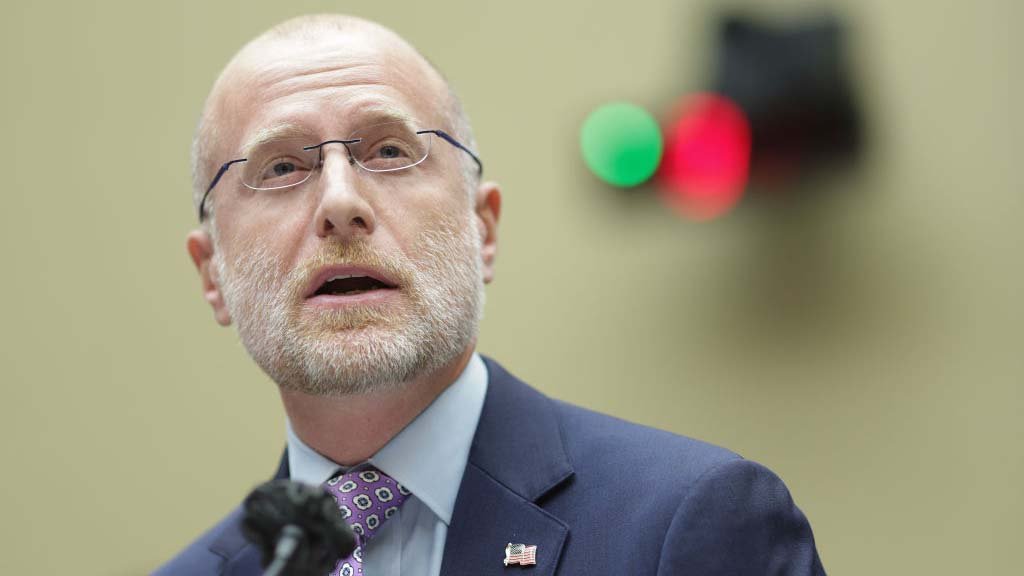
WASHINGTON, DC – MARCH 31: Brendan Carr, Commissioner at the Federal Communications Commission (FCC) testifies during a House Energy and Commerce Committee Subcommittee hearing on March 31, 2022 in Washington, DC. The subcommittee held a hearing on oversight of the FCC. (Photo by Kevin Dietsch/Getty Images)
The remarks were widely interpreted as a threat to use regulatory power to punish speech critical of conservatives — a move that many across the political spectrum condemned as a violation of First Amendment principles.
Ted Cruz calls Carr’s comments “mafioso-like”
Even Senator Ted Cruz, one of the most prominent Republican voices in Congress and typically an ally of conservative regulators, sharply rebuked Carr’s comments on his podcast, Verdict with Ted Cruz.
“I think it is unbelievably dangerous for government to put itself in the position of saying we’re going to decide what speech we like and what we don’t,” Cruz said. “And we’re going to threaten to take you off air if we don’t like what you’re saying.”
Cruz likened Carr’s comments to “something a mafioso would say,” warning that any government official who uses their authority to influence editorial content poses a fundamental threat to free expression.
Fallout: Disney, Nexstar, and Sinclair respond
Carr’s statement had immediate and dramatic consequences across the media industry. Two major broadcast groups — Nexstar Media Group and Sinclair Broadcast Group — both owners of ABC affiliates, announced shortly after his comments that they would **temporarily preempt Jimmy Kimmel Live! ** in several markets.
In the days that followed, Disney, which owns ABC, announced that Jimmy Kimmel Live! would be “indefinitely suspended” pending internal review of the controversy.
The timing of the suspension further complicated matters for Nexstar, which is currently seeking FCC approval for a $6 billion acquisition of Tegna Inc. — a deal that now risks being scrutinized more closely amid questions about FCC impartiality and Carr’s public comments.
The free speech firestorm
Civil rights and media advocacy groups quickly condemned Carr’s comments as an abuse of power and a chilling signal for journalists and entertainers.
The American Civil Liberties Union (ACLU) released a statement saying that any attempt to use broadcast licensing as leverage over political content “violates the spirit and letter of the First Amendment.”
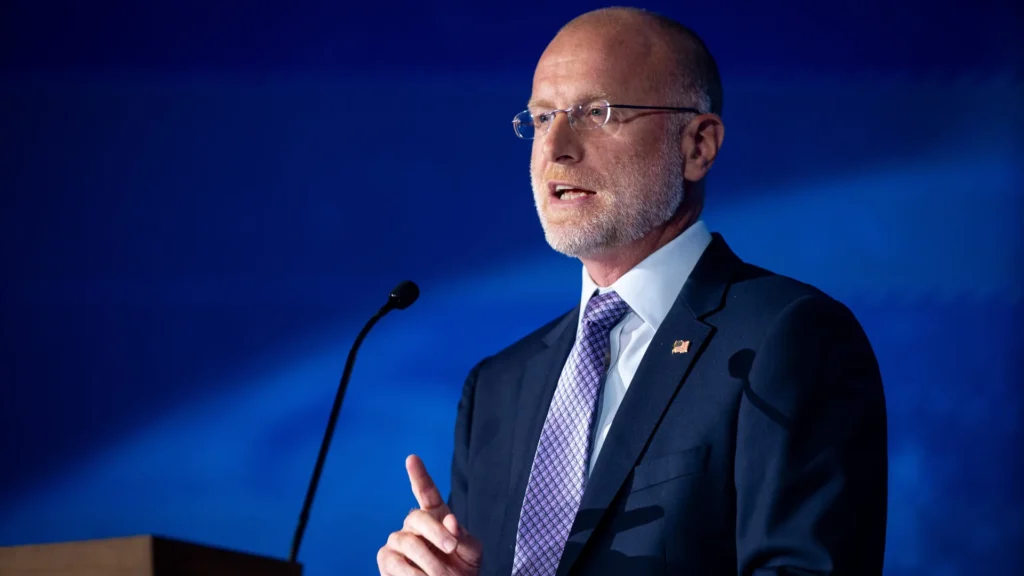
Media ethicist Jeff Jarvis also criticized Carr, calling his remarks “a warning shot at the heart of journalistic independence.”
“When regulators start hinting at consequences for satire or criticism, that’s not regulation — that’s intimidation,” Jarvis said.
The controversy has also reignited discussion over FCC neutrality, with lawmakers on both sides calling for clearer boundaries between regulatory oversight and editorial content.
Carr’s defense and the upcoming testimony
While Carr has not issued a full apology, he defended his remarks in follow-up interviews, claiming that his comments were “taken out of context” and that his concern was about broadcast standards, not political speech.
Still, the pressure has mounted for transparency. His forthcoming testimony before the Senate Commerce Committee is expected to address not only his comments but also broader issues surrounding media regulation, political bias, and FCC independence.
Cruz, who will preside over the hearing, has indicated that the committee intends to question Carr about the “appropriate limits of FCC authority in matters of speech.”
“We’re not going to let the FCC become an arbiter of acceptable expression,” Cruz told reporters this week.
The larger implications
The incident has reignited an old debate over how much power federal regulators should have over broadcasters in the era of partisan media and viral outrage.
If Carr’s comments were intended as an offhand warning, the fallout has proven how seriously such remarks are taken when made by officials with real regulatory influence.
As the FCC continues to oversee billion-dollar broadcast mergers and licenses, Carr’s appearance before the Senate could become a defining moment — not only for his career but also for how Washington approaches the intersection of free speech, media criticism, and political influence in the digital age.
Politics
Justice Samuel Alito admits he still disagrees with same-sex marriage ruling but surprises audience with what he said next…
In a rare moment of restraint, Justice Samuel Alito made it clear he doesn’t support overturning Obergefell v. Hodges, the 2015 landmark ruling that legalized same-sex marriage across the United States.
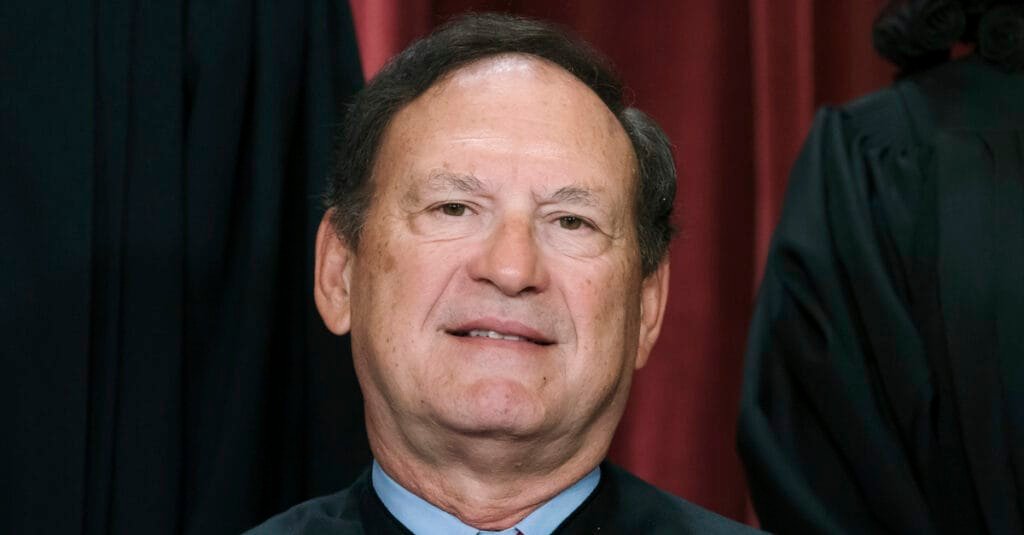
At a recent academic conference, Justice Samuel Alito — one of the most conservative members of the U.S. Supreme Court — revisited one of the most consequential cases in modern American civil rights history: Obergefell v. Hodges (2015), the decision that legalized same-sex marriage nationwide.
While Alito didn’t hold back in expressing his personal disagreement with the ruling, he offered an unexpected disclaimer — one that immediately captured headlines.
ALSO READ : Massive fire erupts at Chevron refinery near Los Angeles… residents told to stay indoors
“I am not suggesting that the decision in that case should be overruled,” Alito told attendees at the C. Boyden Gray Center for the Study of the Administrative State on October 3. “I have to state that so that what I say today is not misunderstood.”
That line — subtle yet deliberate — signaled that even though Alito remains ideologically opposed to the court’s decision, he recognizes Obergefell as binding precedent.
Alito, who wrote the controversial 2022 opinion that overturned Roe v. Wade and ended the constitutional right to abortion in the United States, emphasized that the ruling on abortion did not intend to undermine other precedents such as same-sex marriage.
“Obergefell v. Hodges,” Alito said during the conference, “is a precedent of the court that is entitled to the respect afforded by the doctrine of stare decisis.”
For context, stare decisis is the legal principle that courts should follow established precedent when making decisions, ensuring stability and predictability in the law.

A Complex History of Dissent
Justice Alito’s opposition to Obergefell is not new. Back in 2015, he was among the four dissenting justices — alongside Clarence Thomas, John Roberts, and the late Antonin Scalia — who warned that the ruling could conflict with religious liberties.
Alito’s dissent back then argued that the Constitution does not guarantee a right to same-sex marriage, stating that the issue should be left to voters and legislators, not the courts.
Nearly a decade later, however, his tone appeared less confrontational. Analysts suggest Alito’s statement may be a pragmatic attempt to distance himself from ongoing calls within conservative circles to revisit Obergefell following the fall of Roe v. Wade.
Religious Freedom vs. Civil Rights
His remarks come as the Supreme Court faces renewed pressure from activists seeking to revisit same-sex marriage. A former Kentucky county clerk, Kim Davis, who famously refused to issue marriage licenses to same-sex couples in 2015 due to her religious beliefs, has petitioned the court to reconsider the decision.
While Alito’s speech did not reference Davis directly, his words seemed to serve as a quiet message to those expecting him to lead another constitutional reversal.
“His comment that Obergefell is precedent deserving respect signals that the Court is unlikely to reopen that battle,” said Neal Katyal, former Acting Solicitor General under President Barack Obama, in a statement to legal reporters.
Why Alito’s Words Matter Now
Since the overturning of Roe v. Wade in 2022, there has been widespread concern among civil rights groups that other landmark rulings — such as those protecting same-sex marriage (Obergefell) and contraception rights (Griswold v. Connecticut) — might be next on the chopping block.
Alito’s cautious tone may reflect the Court’s awareness of the political and social shockwaves that another reversal could unleash. Legal scholars suggest that even among the Court’s conservative bloc, there is little appetite to reopen Obergefell amid a deeply polarized electorate.
According to SCOTUSblog analysts, Alito’s remarks could be interpreted as a signal of institutional preservation — a recognition that overturning Obergefell might undermine public trust in the Court, already shaken after Dobbs v. Jackson Women’s Health Organization.
The Ongoing Cultural Divide
Alito’s comments reignited debate on social media platforms like X (formerly Twitter), where users quickly dissected his speech. Some praised his acknowledgment of precedent, while others viewed it as a strategic move to avoid backlash rather than a genuine change of heart.
“Justice Alito still disagrees with Obergefell, but it’s telling that he’s now talking about respect for precedent,” wrote Laurence Tribe, a prominent Harvard constitutional scholar, on X. “That’s a sign of how deeply Obergefell has been woven into American life.”
As the cultural and legal battles over marriage equality continue, one thing seems clear: even the Court’s most conservative voices now recognize the permanence of same-sex marriage in America’s constitutional landscape.
Whether that acknowledgment is rooted in legal respect or political caution — only time will tell.
Politics
Trump sparks outrage with racist AI-generated video of Schumer and Jeffries as shutdown looms
Hours after tense White House talks, Trump posts a manipulated video mocking Democratic leaders while funding negotiations stall.
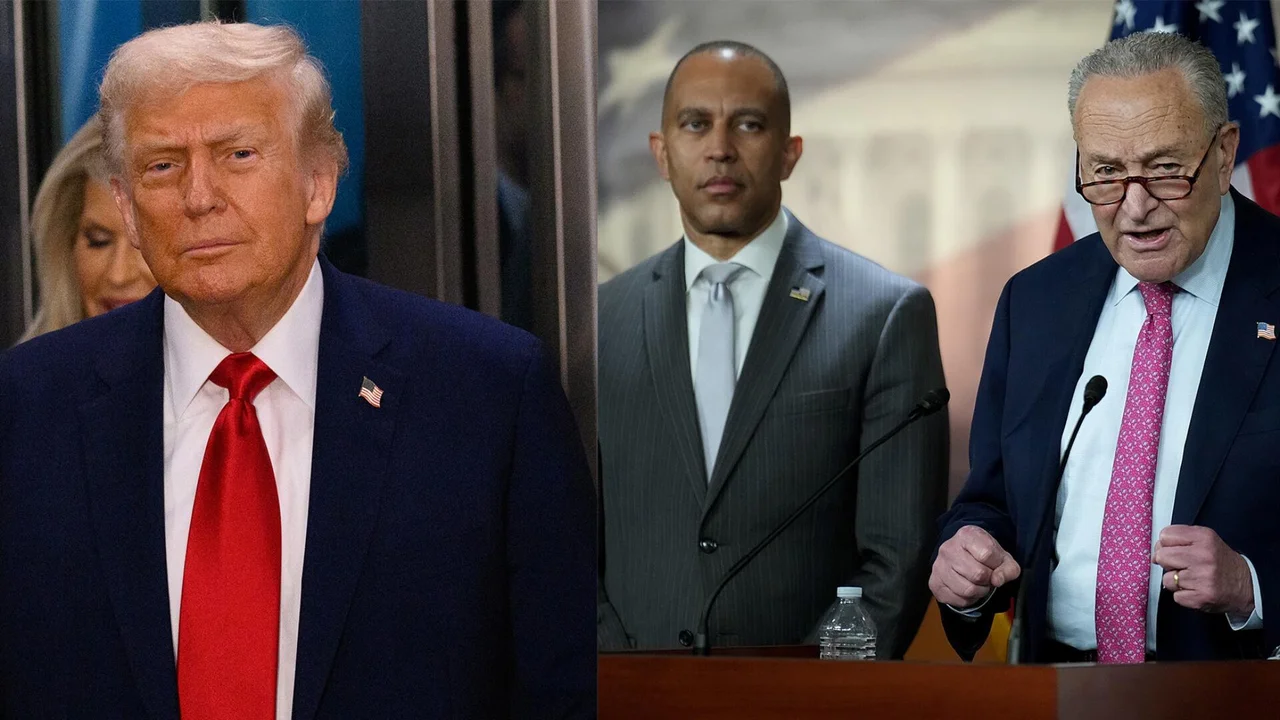
As the United States inches closer to a federal government shutdown, Donald Trump (Wikipedia | X) has inflamed tensions with a controversial social media post. The President shared a video that appears to be AI-generated, depicting Chuck Schumer and Hakeem Jeffries in a racially offensive and mocking light.
The video, posted on both Trump’s X account and Truth Social, shows Jeffries wearing a sombrero and mustache, while Schumer’s voice is altered to deliver fake lines about giving undocumented immigrants “free healthcare.” Mariachi music plays in the background as the doctored voice claims: “Nobody likes Democrats anymore.”
The post landed just hours after a White House meeting where Schumer and Jeffries confronted Trump over looming funding deadlines.
Democrats hit back
Jeffries swiftly condemned the video, writing on X:
“Bigotry will get you nowhere. Cancel the Cuts. Lower the Cost. Save Healthcare. We are NOT backing down.”
Schumer echoed the sentiment, responding:
“If you think your shutdown is a joke, it just proves what we all know: You can’t negotiate. You can only throw tantrums.”
The exchange underscores how far apart both sides remain, with government funding set to expire at midnight Tuesday.

White House meeting yields no deal
Alongside Trump, the meeting also included John Thune , the Senate Majority Leader, and Mike Johnson , the Speaker of the House. Negotiations collapsed without progress, leaving the country hours away from a shutdown that could furlough federal workers and disrupt services nationwide.
Schumer told reporters afterward: “Trump is the decision maker. If he accepts basic provisions to protect healthcare, we can avoid this crisis. But there are still large differences between us.”
Democrats are demanding an extension of Affordable Care Act subsidies that expire at the end of the year. Republicans, however, want a “clean” funding bill without policy riders.
Healthcare at the heart of the fight
Jeffries stressed the stakes for ordinary Americans:
“More than 20 million Americans are on the brink of higher premiums, co-pays, and deductibles because Republicans refuse to extend ACA tax credits. Working-class families are the ones at risk.”
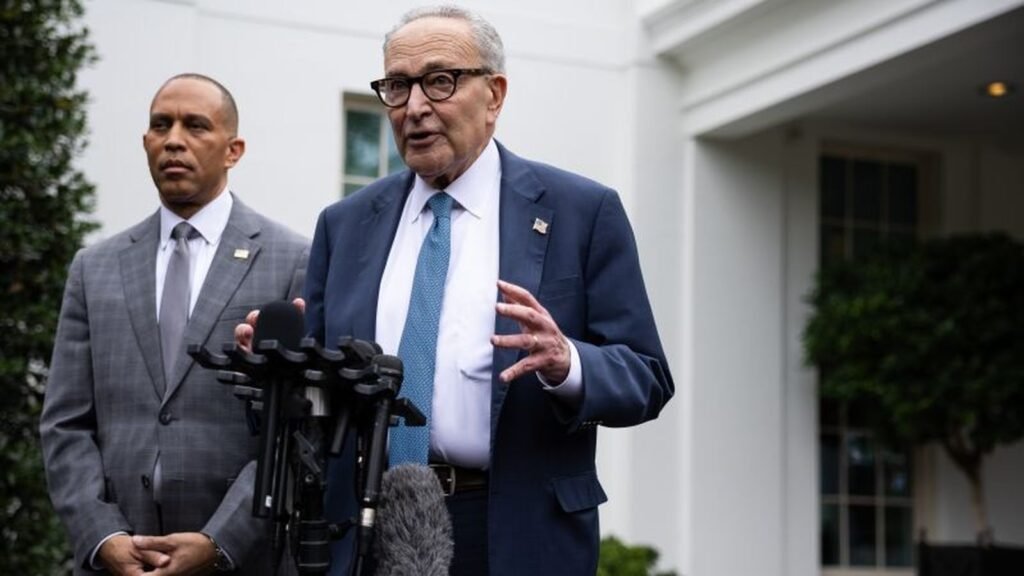
Analysts note that the impasse mirrors past shutdown battles where healthcare, immigration, and spending cuts became flashpoints.
The bigger picture: AI, politics, and disinformation
The AI-generated video raises fresh concerns about how manipulated media is being deployed at the highest levels of politics. Experts warn that such content could further polarize voters ahead of the 2026 midterms.
While Trump’s loyal supporters hailed the post as “humor,” critics argue it trivializes the severity of a government shutdown and fuels racial stereotypes. The White House has yet to formally comment.
With time running out, the focus now shifts back to Congress — and whether either side can compromise before the deadline. For now, Trump’s video has added yet another layer of controversy to an already bitter standoff.
For more Update http://www.dailyglobaldiary.com
-

 Entertainment1 week ago
Entertainment1 week agoDolly Parton delays Las Vegas concerts by nine months citing health challenges but promises unforgettable return
-

 Entertainment1 week ago
Entertainment1 week agoZoey Deutch engaged to comedian Jimmy Tatro after 4 years of dating with romantic beach proposal
-

 Entertainment4 days ago
Entertainment4 days agoSurvivor Season 49 episode 2 shocker Kele tribe loses again and fans stunned by who went home
-

 Sports3 days ago
Sports3 days ago‘Silent killer’ Cam Schlittler stuns Red Sox as Yankees rookie makes history with 12 strikeouts
-

 Crime & Justice5 days ago
Crime & Justice5 days agoProsecutors demand 11 years for Diddy after shocking trial says Cassie’s testimony revealed dark truth
-

 Politics1 week ago
Politics1 week agoBarack Obama blasts Trump over Tylenol autism claim calling it ‘violence against truth’ but that’s not all he said…
-

 Sports5 days ago
Sports5 days agoTottenham’s Champions League wake-up call… why Spurs must stop looking like a Europa League side
-

 Sports2 days ago
Sports2 days agoShohei Ohtani finally pitches in MLB playoffs after 2,746 days… will this be the moment that defines Dodgers vs Phillies?


















